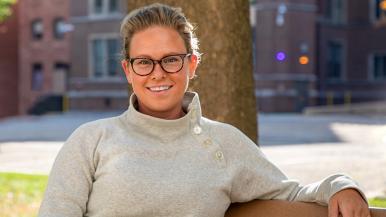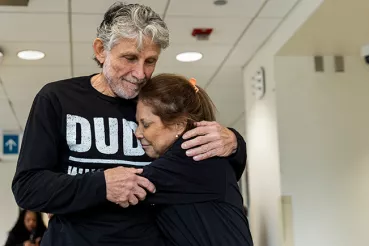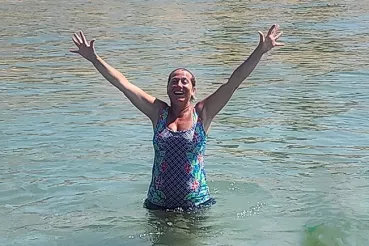In April 2018, I was 28 years old and a newlywed, and I had my whole life ahead of me. But that feeling shifted when I did a breast self-exam and found a lump.
I saw a primary care physician who ordered a mammogram for me. A month later I had a mammogram, breast ultrasound, and biopsy — revealing a diagnosis of stage 2 breast cancer.
After my initial diagnosis, I wanted to get a second opinion. I went to Rush University Medical Center because the breast cancer team came highly recommended. After meeting with the team, I chose Rush for my care because I was confident in the treatment plan that the team recommended for me and felt so cared for by the whole team.
Since choosing Rush for my care, everyone I've encountered has been incredibly thoughtful, caring, and supportive along my journey. My team includes medical oncologist Ruta Rao, MD, breast surgeon Andrea Madrigrano, MD, plastic and reconstructive surgeon Keith Hood, MD, advanced practice provider Sarah Anzevino, NP, and nurse coordinator Maura Kimball, RN.
Fertility preservation
Before I began my cancer treatment, my doctors encouraged me to do fertility preservation, so my husband and I can hopefully have children in the future. It wasn’t something we initially thought of. I was grateful my team brought the idea to our attention, and that we had the opportunity to do it.
A week after completing my fertility preservation, I started chemotherapy. It all happened so quickly.
Treatment during a pandemic
My treatment started with six rounds of chemotherapy to help shrink the tumor. I then had a double mastectomy and immediate breast reconstruction. I completed a year of targeted therapy infusions, and now I take a daily medication that is accompanied by a monthly injection to reduce the risk of a recurrence.
I had just received my March injection when COVID-19 was starting to pick up in Chicago. My care team and I decided to change my medications, which would not require coming into the hospital for the injection.
As Rush quickly developed safety measures to bring patients back for their care, I was impressed with how streamlined they made the process in such a short amount of time. They asked me screening questions before my appointments, took my temperature every time I came to the clinic, provided me with fresh hospital-grade masks when I arrived, and had hand sanitizing stations throughout the campus.
Their efforts made me feel comfortable and safe. Ultimately, I was able to return to my initial treatment plan in May.
Finding support online
Early on in my journey with cancer, I realized that the majority of support groups for breast cancer were for women who were older than me. The issues a post-menopausal woman with breast cancer faces can be drastically different than those of a young, pre-menopausal woman.
Through social media, I found an online community of young women who have been diagnosed with breast cancer or with genetic predispositions to breast cancer. Their support made me feel like I wasn’t the only one my age going through this disease. It has been so valuable to have this community of young women who can relate to my concerns about fertility, relationships, survivorship, and even fear of recurrence.
I also began sharing my journey with cancer on my own social media accounts. I relay what I have learned and experienced so other young survivors can hopefully feel a little bit less alone — I think that is so important.
‘Healing is not linear’
Since being diagnosed with breast cancer, I try my best to take advantage of every opportunity I can to live my life, such as interacting with my online breast cancer community, spending time with my husband, and being active.
But there are days when I’m not OK, and I feel a sense of grief, sadness, and loss of my pre-diagnosis life. It has taken me a long time to come to terms with the fact that my journey is not going to be a linear progression of feeling better.
Survivorship is a journey of its own, though I'm grateful to be in this phase. It’s hard, and that's OK — healing is not linear. Giving myself this grace has allowed me to thrive after my breast cancer diagnosis.




